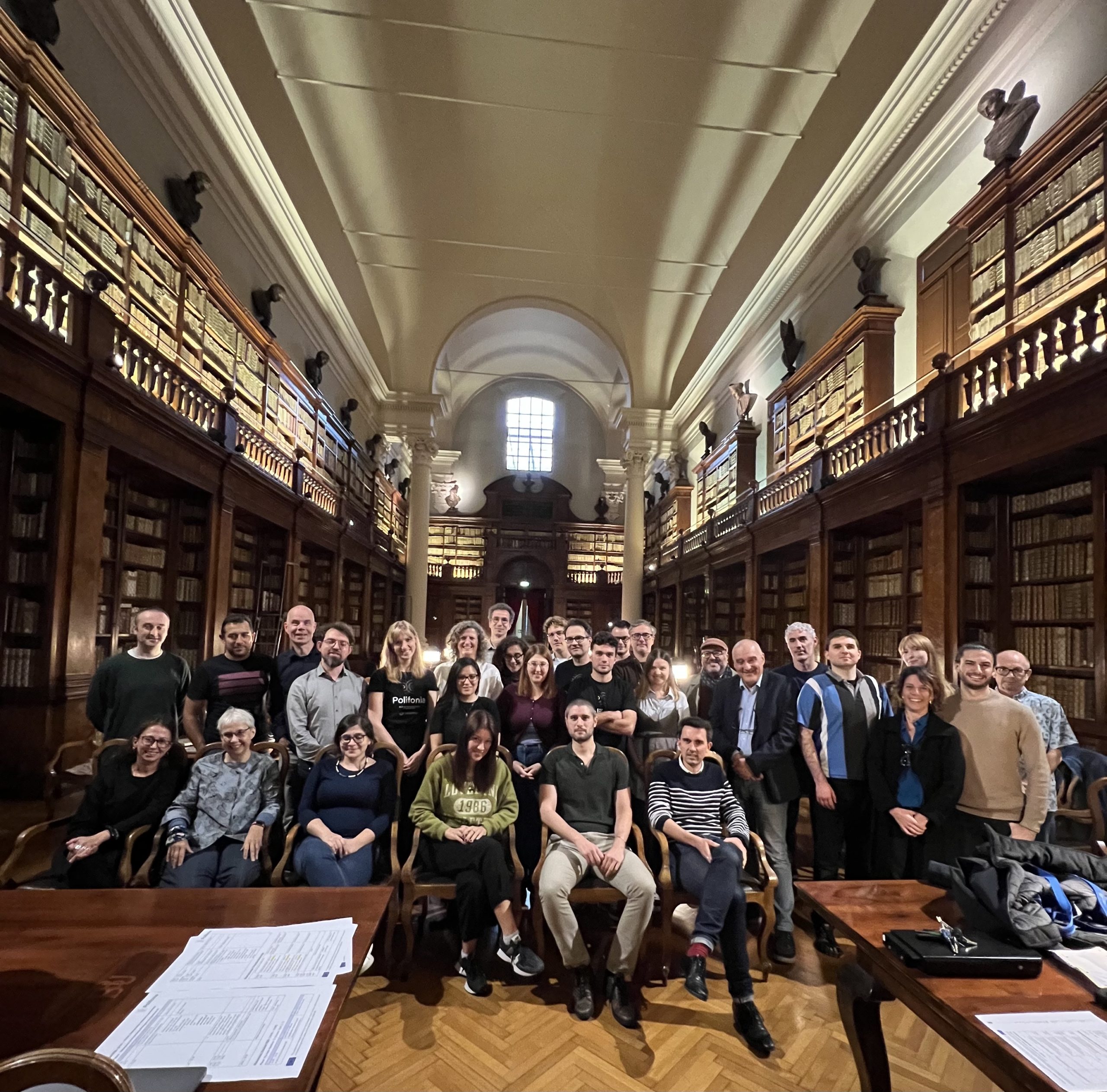#report: Bologna home for 7th project meeting of Polifonia, 16-20 October 2023
Between 16 and 20 October, the Polifonia consortium met in the Italian city of Bologna, home of the project coordinator University of Bologna (UNIBO). During an intensive week, the project team took steps in the development of the pilots, including the long-awaited web portal. Read more about the 7th project meeting here.

Between 16 and 20 October, the Polifonia consortium met in the Italian city of Bologna, home of the project coordinator University of Bologna (UNIBO). During an intensive week, the project team took steps in the development of the pilots, including the long-awaited web portal. Read more about the 7th project meeting here.


It is still well above 20 degrees in the Italian city as the consortium members begin their 7th plenary project meeting. The historical city, with eye-catching towers from the Middle Ages, is also known for its special relationship with music and is home to the oldest university in Europe, which was founded in 1088.
On the first day, members of the consortium met at the invitation of UNIBO in the Aula Magna of the Biblioteca. The Aula Magna is the main hall of the university library, designed by Bolognese architect Carlo Francesco Dotti and opened to the public in 1756. The Aula magna contains about 30,000 ancient volumes, printed between 1500 and the late 1700s. The first two meeting days were held in this historic room.
The last time the entire team saw each other was in Paris, September 2022. Since then some new project members have joined, resulting in some meeting in person for the first time. After the introductions, the normally online and remote project members were able to give an update in person on the status of their pilots. The advisory board members were also invited this afternoon to hear the progress of the project and provided the Polifonia team with their expertise.


After the first session on Monday, the team ended the day with picking up Polifonia t-shirts and visiting the Biblioteca Salaborsa, where the consortium checked out the Data Wanderings installation created by the cultural association Umanesimo Artificiale. The visuals are based on the data from the ChoCo dataset. The art installation opened on Friday, Oct. 13 and can be visited until the 28th of October.


The next day consortium members were proud to wear the Polifonia t-shirts and ready to receive on- and offline Stakeholders. During this Stakeholder dedicated day, the focus lay on close collaboration with a few stakeholders as opposed to the Stakeholder network meeting in Paris, where all stakeholders were invited. Since then the stakeholder network has grown from 30 members to 52.
Stakeholders on site – e.g. the Digital Music Observatory and Podiumkunst.net – gave a presentation about their relation to the project. Simon Holland reported from Salerno, where he collaborated with teachers and kids from the Eleonora Pimentel Fonseca institute. The discussions in the afternoon evolved around alignment challenges of the data from the stakeholders in relation to the Polifonia Knowledge Graph.The day ended by taking a group photo in the impressive, historic library room.


The city’s many famous ‘portici’ (porches) protect project members from the heavy rain that has replaced the sun since earlier that week, as the team crossed town to another part of the campus to continue working sessions. The third day started with a debrief on the Stakeholder day and the advice from the advisory board members. The Ecosystem workshop chaired by Enrico Daga, started, to give the consortium an update on the automatic processes around the Ecosystem. In the afternoon the discussions continued in smaller groups. Wednesday evening was reserved for a social dinner including stakeholders that were still in town.

On Thursday, the main focus was on the web portal, which the consortium kicked off with an evaluation session lead by Marco Grasso. The portal as it is today was tested for usability by all attendees. The session on the web portal continues after the lunch break, but this time Marilena Daquino addressed the work on populating the portal with Pilot knowledge graphs. Parallel sessions were dedicated to the TONALITIES pilot, whose members from UNIBO and CNRS tried to overcome the challenges they face in this pilot. Pilot Leaders of ORGANS (Peter van Kranenburg, KNAW) and BELLS (Elena Musumeci, Italian Ministry of Culture) sat down to discuss the ontologies used in both pilots. A Work Package 3 meeting, lead by James McDermott, dived into the upcoming D3.6 and the effort of bringing strands of research together. Work Package 4 and KCL organized a hackathon knowledge sharing and workshop on large language models and knowledge graphs.

For the evening, project leader Valentina Presutti invited the entire team and a jazz formation to her home, located in the heart of Bologna. The members of the consortium participated in the jam session or shared their impression of the city of Bologna while enjoying Italian wine.
On Friday the day started with a general assembly. Working groups were formed around MEETUPS and INTERLINK, but also around topics like reusability and licenses. Work package 6 discussed possibilities with interaction with the general public and artists, for instance via TikTok or through a composition challenge based on sound samples and midi in our project (bell, organ and folk melody).

Polifonia looks back on a productive week in Bologna and looks forward to the most exciting phase of the project: the final 6 months. A follow-up meeting to ensure this final phase runs smoothly is scheduled for February 2024.
Pictures by: Alma Mater Studiorum – Università di Bologna, Matia Terenzi, Andrea Scharnhorst, Marloes Bontje, René Voorburg.










